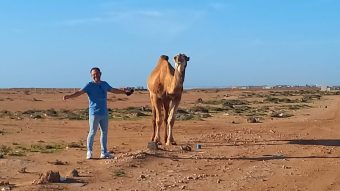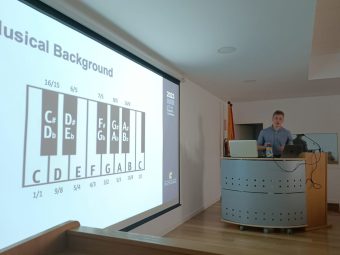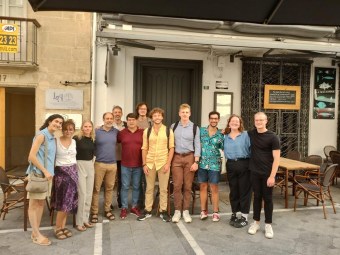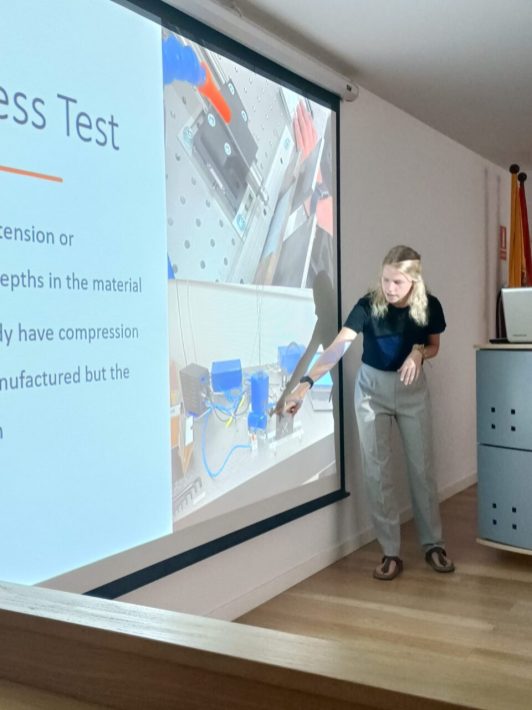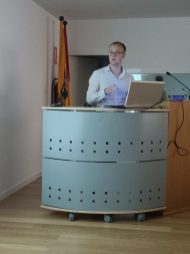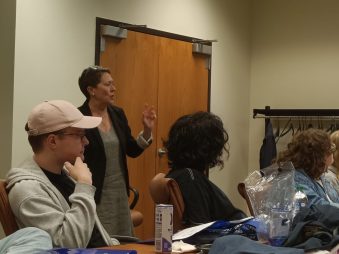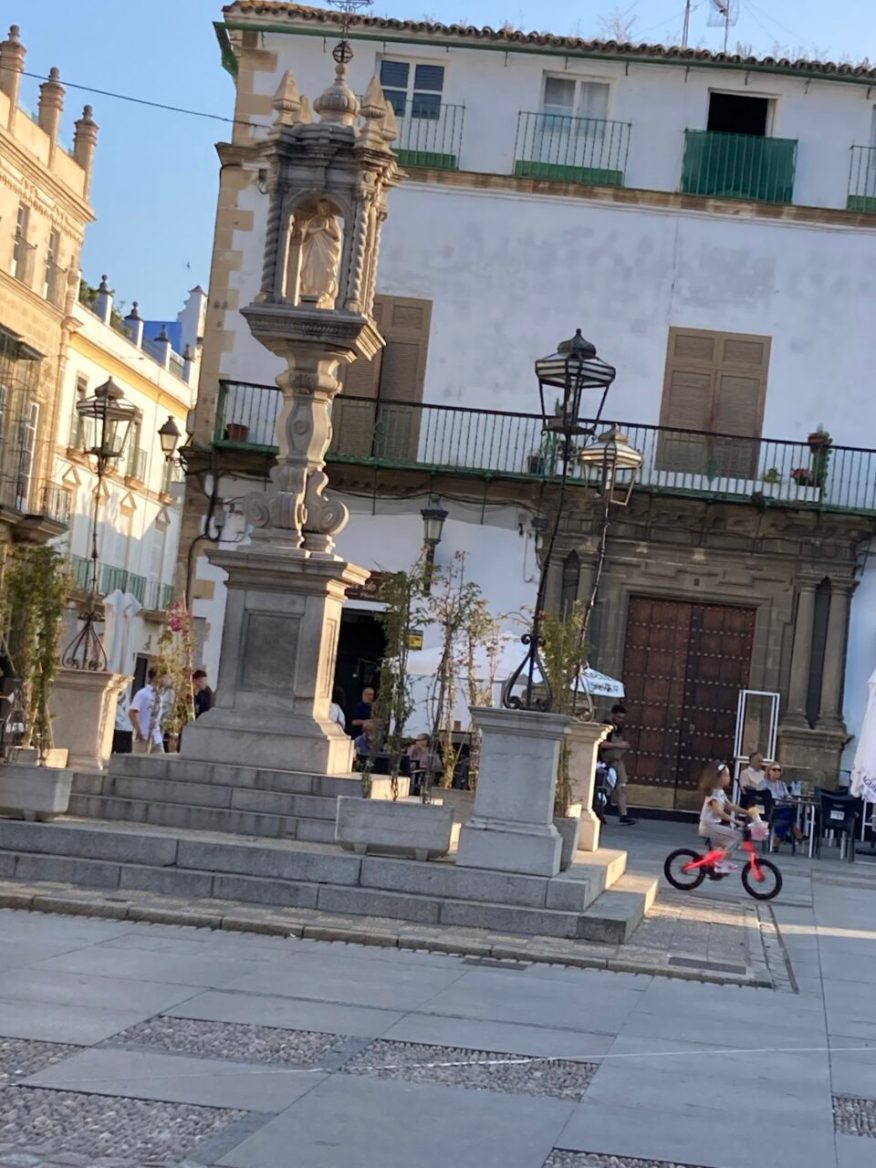
Electrical engineering major John Lazenby was one of eight UTC students who participated in this summer’s Cadiz International Research Program in Cadiz, Spain (photo courtesy of John Lazenby).
Joseph Duhamel didn’t speak Spanish when he got accepted into the Cadiz International Research Program at the University of Tennessee at Chattanooga.
A mathemathics major minoring in computer science and chemistry, he never explored a foreign language until getting accepted in the Cadiz program.
Still, Duhamel learned enough Spanish to present his research on math, music and machine learning en español by the end of the 10-week summer program. A partnership between UTC and the University of Cadiz in Spain, the program is open to all UTC undergraduate and graduate students.
Immersed in scientific investigation and Spain’s vibrant culture around the clock, Duhamel said the experience “blew my mind, changed how I think.”
“The research took me in a direction that I didn’t expect,” he said. “And being in an environment where you’re constantly learning, even going to the grocery store, kept me engaged. I always went into work thinking, ‘What am I going to learn today?’ and not, ‘I’ve got to complete this thing.’”
———————————————
Click here to learn more about undergraduate research opportunities at UTC
———————————————
Electrical engineering major John Lazenby happened to already speak Spanish before getting accepted into the program.
He also got a two-for-one immersion while researching microelectronics in Cadiz.
“For me it was hand-in-hand. My Spanish got better and my understanding of my research got better at the same time. The most interesting thing was having to break down complex, technical ideas and words, especially in the beginning, into smaller pieces,” said Lazenby, who began studying Spanish in grade school.
“Using easier, more simple words that reflected more foundational concepts, from a scientific perspective and understanding, helped me a lot,” said Lazenby, one of eight UTC students who participated in the program this year.
No experience? No problem.
UTC students interested in participating in the 2024 Cadiz International Research Program must submit their applications by Nov. 5 and letters of recommendation by Nov. 13.
The program covers travel expenses and provides living stipends to help defray participant costs. Each participant is paired with a research mentor from the University of Cadiz.
Previous experience in research or Spanish is not necessary, said Dr. Joanne Romagni, vice chancellor of research and dean of the UTC Graduate School.
“Nobody has to have a research topic or even speak any Spanish to get accepted. They have to be interested in research and interested in experiencing a different culture,” Romagni said.
While it’s far from a relaxing summer abroad, rich cultural experiences are built into the program.
“This is a serious research program and our students get to do things they won’t always have the opportunity to do here,” Romagni said. “For our undergraduates, it’s often their first experience with research. Nobody is holding their hands, and it can be intimidating.”
Romagni established contacts at the University of Cadiz while doing post-doctoral chemistry research there in the early/mid-2000s. She parlayed the experience into a summer research program for students and she brought that program with her to UTC in 2015.
It started primarily with graduate chemistry students but has expanded to include undergraduates and students in all fields of study, from engineering and math to history and art.
Money matters
Because a majority of college students work over the summer to help pay for school, providing financial support to participants over the years has also been paramount for Romagni.
“We can’t pay the same kind of stipend as the NSF (National Science Foundation), but we want them to concentrate on their research and pay them to do it,” she said.
Students must describe their current studies, interest in research and career aspirations as part of the application process. Those accepted into the program are placed in labs or academic departments with mentors specific to their studies and passions—thanks to a network of professors and staff at the Spanish university Romagni has cultivated for the past 20 years.
Most participants thrive in the program, she said, while some discover research is not for them.
“A student could think they love research but end up really hating it, which is important to know before you go to graduate school,” she said.
The great unknown
For those genuinely interested in research, it’s like a mystery novel you can’t put down, Romagni said.
“It’s a lot of what-ifs and you don’t know where you’re going or what’s going to happen,” she said.
“Then, when you make those discoveries and find those little crumbs along the way, it’s fun and you can’t quit until you figure it out. And with research you’re never really done anyway.”
For Lazenby, the Cadiz International Research Program was a natural fit—considering his previous paid undergraduate research work at UTC and interest in Spanish. (He also speaks French.)
The biggest difference between working in an American lab versus working in a Spanish is the amount of social interaction and the schedule, he said.
“There’s twice as much social interaction in Spain between coffee breaks and lunch,” Lazenby said. “The additional time away from your work, I’ve found, helps relax your mind a bit and is really useful when you get back into your work instead of working six straight hours with no breaks.”
Learn More
Cadiz International Research Program
UTC Undergraduate Research and Creative Endeavor
